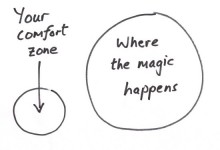By Kurtis Bell, ServiceMaster by Bell
In my typical scouring of the internet to find inspiration for my monthly networking article, I did the usual. I had an idea in mind; I searched for some related articles, and found nothing. I stumbled across three or four more other seemingly great topics, but could not figure out how to expand upon them in a way that is not plagiarism. Then, I read four words from the billionaire philanthropist Melinda Gates that lifted my monthly writer’s block (and also sent me down a psychology rabbit hole)—“Get comfortable being uncomfortable.”
Sure, being uncomfortable is uh…uncomfortable. It is most people’s natural instinct to avoid situations that push the limits of their comfort zones. People much smarter than I call it Avoidance Coping, and also say that it can be a contributing factor in anxiety. Say I hate going to crowded places, so I try not to stray from my comfort zones. Slowly but surely the places in which I feel most comfortable will begin to shrink, and I will not leave my own home due to the overwhelming anxiety of the discomfort found in places that are not my home.
I try to constantly push my boundaries, and because of that I typically find myself in uncomfortable situations. It is how you handle these uncomfortable situations that can define you, your network, and your career. For example, if I back down and retreat to my safe space any time I experience social discomfort, I will most likely not be able to develop a great network.
I could have a network of hundreds on LinkedIn, but how well will these people know me? Will they feel comfortable connecting me to one of their connections? Conversely, if I am mindful of what I am feeling and acknowledge those emotions, I can begin to cope with uncomfortable situations in a constructive manner.
In an uncomfortable situation, I notice my heart rate increase, my mind begins to race, and I tuck my hands in to my front pockets as I grin and nod my head. When I notice these things, I do not label them as good or bad, I simply note them. Then, I can try to bring myself and my mind back in to the room. My inner dialogue sounds like this; “You’re doing the hands in pockets and nodding thing again. You must be uncomfortable. That is fine, you can feel that later. For now though you have to focus on engaging others in conversation and not standing in a corner.”
Strive to be more mindful, acknowledge your emotions, and get comfortable being uncomfortable.
This article was published in the Venango Area Chamber of Commerce’s June 2018 edition of the VenangoWorks! Newsletter.
